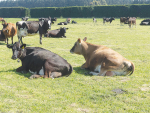Vets' greater understanding of livestock’s ability to sense pain has more of them integrating pain relief into some treatments, as regulations also start to tighten on treatment standards.
On October 1 this year, it will be a legal requirement that all cattle being disbudded or dehorned will need appropriate and effective local anaesthetic authorised by a veterinarian. The New Zealand Veterinary Guidelines also recommend the use of an appropriate long-acting pain killer at the time of disbudding and dehorning.
Boehringer Ingelheim Animal Health NZ technical veterinarian James Laidlaw says the new rules for de-budding reflect a shifting attitude towards the understanding and application of pain relief, as well as moves to improve welfare in farm animals.
“Our understanding and recognition of animals’ ability to sense pain has shifted considerably in the past decade. But results from various global surveys indicate there is still quite a wide range of opinions from vets and farmers about where they perceive different operations and conditions sit on the pain scale.”
Globally, surveys of vets and farmers over the last 10-15 years have highlighted the difficulty of interpreting pain in cattle. This is mostly due to the fact these animals have evolved to hide displays of pain.
“Vets and farmers have been well aligned in their assessments, but the surveys have highlighted wide ranges of individual interpretations of how painful various procedures and conditions are in cattle.”
Historically, a lack of standardised guides to assessing pain in cattle and benchmarking of how painful conditions and procedures are has made interpreting pain and approaching pain relief difficult.
Meantime farmers are facing increasing demands from consumers for higher welfare standards in farm animals and higher public expectations of farm animal welfare. These and the provision of pain relief are driving the industry to be more conscious about addressing pain in farm animals.
“This is something we need to be considering if we wish to market the highest quality product and to maintain our ‘clean, green image’ locally and globally.”
Mastitis ranks as a significant pain causing condition in dairy cows. Work by one of the country’s leading animal researchers indicates offering anti-inflammatory pain relief medication and antibiotic mastitis treatments, even for moderate cases, can improve an animal’s response rate and productivity.
Dr Scott McDougall’s 2009 and 2016 studies on mammary health and fertility found using a non-steroidal pain reliever like Metacam20 when treating even mild cases of mastitis resulted in lowered somatic cell counts.
There was also a 42% lower likelihood cows would be culled for mastitis, when compared with placebo treated cows. Researchers found administering Metacam20 with antibiotic mastitis treatment improved the probability the cow would conceive to artificial insemination on her first service, and also increased the probability she would be pregnant by 120 days post-calving by 29%.
A further unexpected finding was cows treated with Metacam20 and antibiotic mastitis treatments had a 32% higher chance of bacteriological cure than cows treated with antibiotic and a placebo.
“So even putting aside the welfare issues of delivering anti-inflammatory pain relief medications, there are proven production benefits that make addressing the pain element that accompanies mastitis well worthwhile,” says Laidlaw.


















